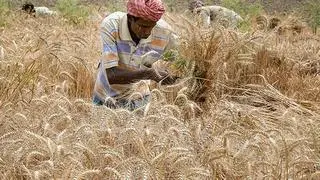With little more than two weeks left for the Winter Session of Parliament, the government is finalising a model Goods and Services Tax law that can be enacted by the Centre and each State with a few regional variations once the Constitution Amendment Bill is passed.
“Finishing touches to the draft are being given…the final meeting of officials involved in drafting the law took place a couple of days back,” a senior Finance Ministry official said.
The draft Bill will also be discussed by the Empowered Committee of State Finance Ministers in its next meeting, the date of which is yet to be finalised. Under the draft proposal, the existing tax exemptions, which are a sizeable number, will be reviewed and also trimmed, an official associated with the development said. Each State can notify its list of exemptions, he told BusinessLine .
Chief Economic Adviser Arvind Subramanian in his report on Possible Tax rates under GST has suggested that exemptions need to be reduced under the proposed tax regime.
“Indeed, revenue neutrality for the Centre can only be achieved if base for Centre is similar to that of the States (which have fewer exemptions – 90 products versus 300 for Centre). If the policy objectives have to be met, instruments other than tax exemptions such as direct transfer could be deployed,” he stated.
Political divide While a political divide still remains on whether GST should be expanded to include alcohol and petroleum products, a consensus is building on fixing a deadline for bringing petroleum products under the purview and also have some levy on alcohol. The two products together would contribute almost 40-50 per cent to GST revenues.
The Centre is keen on implementing the GST from April 1, 2016 with hopes that it would boost economic growth by at least 1.4-1.8 percentage points by 2017.
“There is a little more than two weeks left of the Winter Session and consultations are still on with the Opposition and States. So either extending the current session or calling a special session can not be ruled out to get the Constitution Amendment Bill for the tax passed in the worst case scenario,” said two sources close to the development.
Meanwhile, the Business Advisory Committee of the Rajya Sabha has also allocated four hours for The Constitution (122{+n}{+d} Amendment) Bill 2014 as passed by Lok Sabha and as reported by Select Committee of Rajya Sabha (GST Bill) this week.
IT system Besides, building a political consensus another challenge before the Centre is to put in place the backend (Information Technology) system for the new tax regime. In case, the system is not fully operational before April 1, an alternative under active consideration is that the tax could be notified on the set date and systems will be put in place over the next few months.
On the political front, the Centre, backed with Subramanian panel report, is also expected to re-start negotiations with the Congress, said sources. A number of States that BusinessLine contacted said a final decision on rates would be taken by the Empowered Committee of State Finance Ministers and the proposed GST Council. However, they would support proposals to abolish the proposed one per cent manufacturing tax.
“In national interest, we will support any consensus reached by the national parties on the model of GST. But there has to be discussion on the GST rates with States,” said Saurabh Patel, Gujarat’s Finance Minister, adding that as long as the Centre would compensate for loss of revenue, States would not object to the scrapping of the additional levy of one per cent.
Officials from States including Andhra Pradesh, Bihar and West Bengal also echoed similar views and said they were not in favour of including the tax rates in the Constitution Amendment Bill.







Comments
Comments have to be in English, and in full sentences. They cannot be abusive or personal. Please abide by our community guidelines for posting your comments.
We have migrated to a new commenting platform. If you are already a registered user of TheHindu Businessline and logged in, you may continue to engage with our articles. If you do not have an account please register and login to post comments. Users can access their older comments by logging into their accounts on Vuukle.